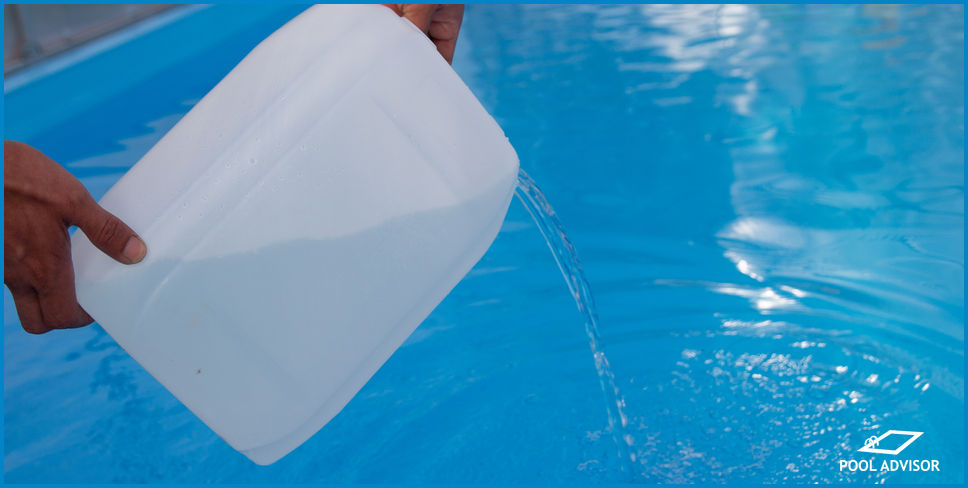
Where Can You Buy Muriatic Acid In Australia?
Muriatic acid, known more commonly in Australia as hydrochloric acid, is used in a variety of applications for swimming pool maintenance.
These include lowering your pool’s pH and total alkalinity, using it as an aid to the stain removal process, or performing an acid wash on stubborn areas of grime.
In this article, we will let you know where you can buy muriatic acid in Australia and explain the differences between muriatic acid and hydrochloric acid.
Where To Get Muriatic Acid
Because hydrochloric acid is highly corrosive to the skin and eyes and is regarded as a dangerous good, it typically cannot be purchased online and then shipped to your home.
This product must usually be picked up from an in-person supplier, such as your local hardware store or pool maintenance shop.
Sometimes sold under the more colloquial name of ‘pool acid’, you can find hydrochloric acid available for purchase at both Bunnings and Mitre10.
We recommend checking your nearest store’s availability online or by phone if you are able to, as not all locations will carry these products regularly.
When purchasing your hydrochloric acid, it is a good idea to make note of the concentration percentage listed on the packaging.
While most varieties of hydrochloric acid have a concentration of about 30%, knowing this information can help you figure out how much acid to use for your pool if you are using it to adjust the pH or total alkalinity.
You can use this hydrochloric acid calculator to work out the right amount of hydrochloric acid to add to your pool.
You should also make sure that your hydrochloric acid comes with a material safety data sheet. This information is sometimes printed on the label of the product, but should be legible. Here's an example one for your reference - just keep in mind that your product may be stronger than this one, so the risks may be greater.
It is important to have access to this information in order to follow any safety guidelines, and so that you know what to do in case of accidental exposure to the acid.
Alternatives
If the safety issues around hydrochloric acid put you off it, I have some good news - there is an alternative. Sodium bisulphate, also known as dry acid, is well, what it sounds like... acid in a dry, powdered form.
As it comes in a dry form, it doesn't splash up onto you while you are pouring it into your pool or into a container. This means less risk of chemical burns to your skin, or damage to your pool tiles.
It's also more stable than hydrochloric acid and there's less risk of overshooting and accidentally adding too much.
Another benefit of dry acid is that where hydrochloric acid must be bought from a hardware or pool supply shop because it's dangerous good classification prevents it from being sent in the mail, dry acid can be freely purchased online and delivered to your doorstep.
For many, it's the far more convenient and safe option.
Is Muriatic Acid Sold In Different Concentrations?
Muriatic acid can be bought in a variety of concentrations, usually between 10% and 30%, though you'll generally find it at around 30% when sold as pool acid.
Higher concentration tends to be better when adjusting pH, though this can be overkill when used for cleaning pool surfaces or your salt cell.
Think about what you plan on using the acid for and purchase an appropriate strength to reduce the risk of damage to you or your pool.
What Size Is It Typically Sold As?
Hydrochloric or muriatic acid is usually sold in 5 litre containers. As it is a dangerous good, it's generally not sold in larger, bulk-style containers as this can trigger chemical handling and storage laws.
Bear in mind that 5 litres is A LOT of acid, more than enough to adjust your pool pH many times over. One 5L container will likely last you many pool seasons, so I wouldn't try to purchase more than this in one go.
How Much Does It Cost?
Expect to pay around $20 for 5 litres of hydrochloric acid at a hardware store. As I mentioned above, this will last you a long time so it is reasonable price all things considered.
This tends to be cheaper than the equivalent amount of dry acid, though there are more safety issues to consider when storing and handling hydrochloric acid.

Louis
A chemical engineer by trade, Louis is committed to debunking myths in the pool industry by explaining the underlying chemistry and making it accessible to all.
